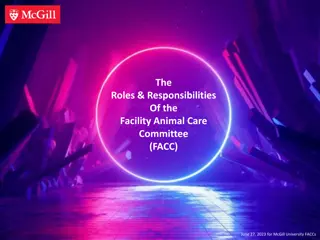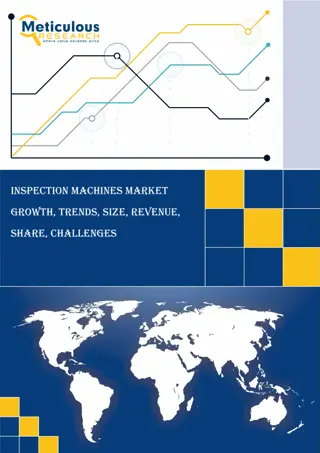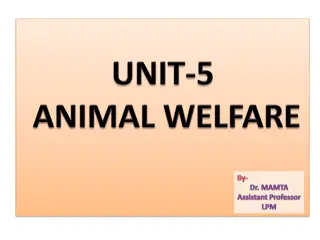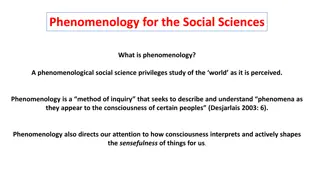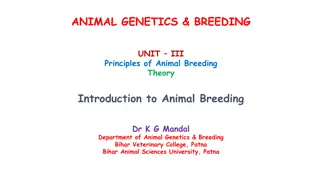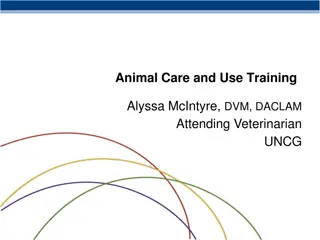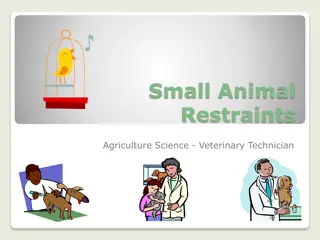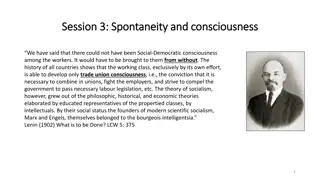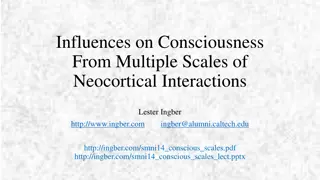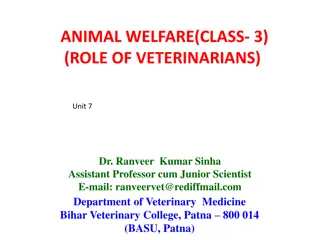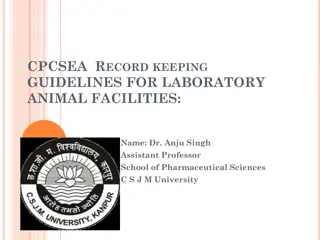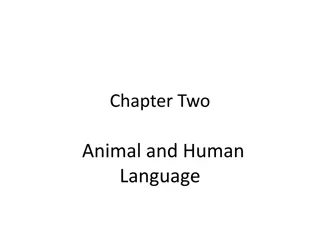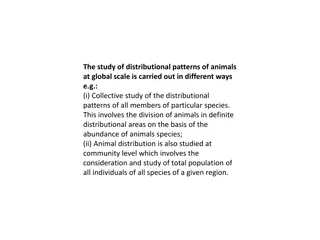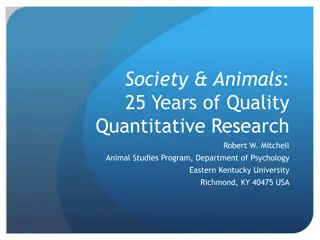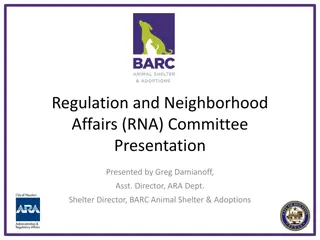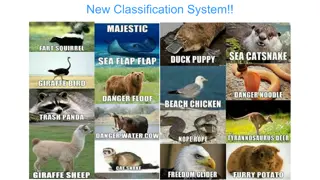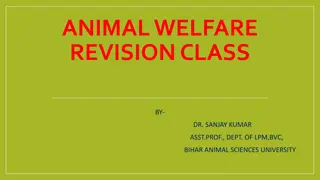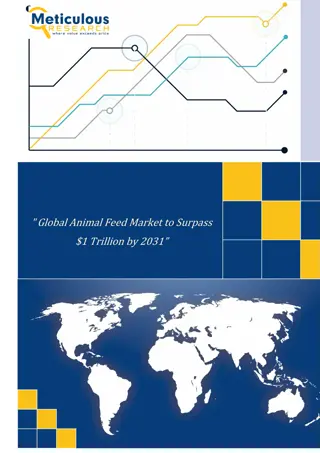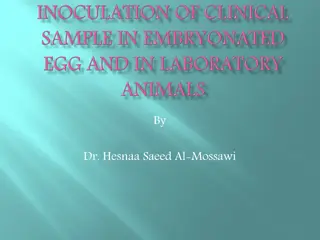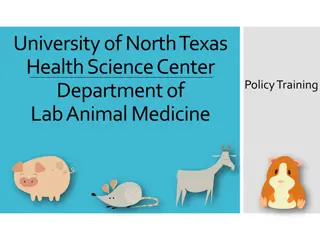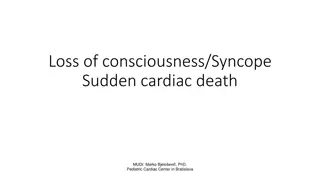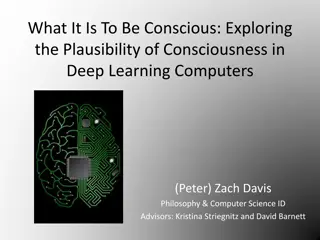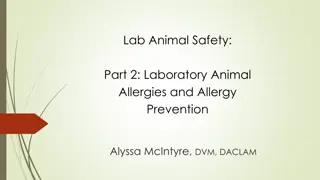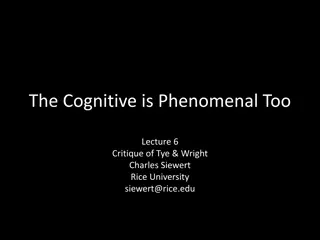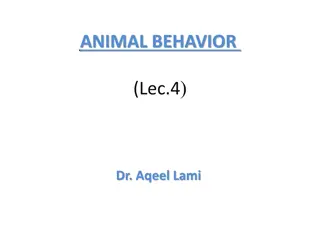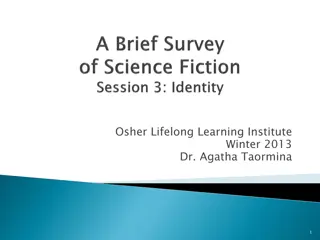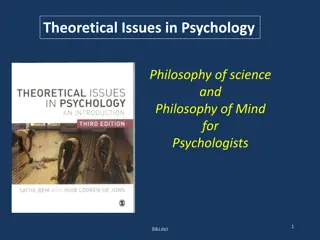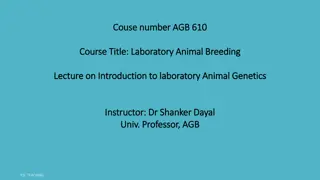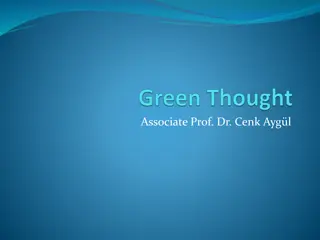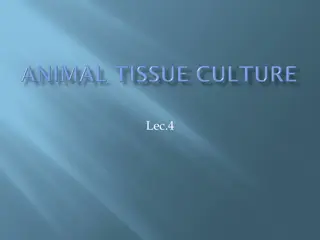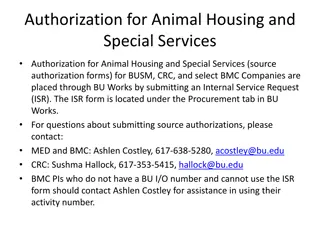History and Educational Programs of DEU Lab Animal Science Department
Established in 2004, the Department of Laboratory Animal Science at Dokuz Eylul University Institute of Health Sciences offers cutting-edge education focusing on animal welfare and ethical practices in scientific research. The department upholds the 3R Principle—Reduction, Refinement, Replacement�
0 views • 9 slides
Responsibilities of Facility Animal Care Committee at McGill University
The Facility Animal Care Committee (FACC) at McGill University oversees animal activities, ensures ethical treatment of animals, and adheres to guidelines from organizations such as the Canadian Council on Animal Care (CCAC). Responsibilities include continual oversight of animals, approving care pr
1 views • 13 slides
Feed Software Market is expected to reach $456.1 million by 2030
The growth of this market is attributed to the adoption of digital technologies and automation in the animal feed industry, the growing animal population, increasing demand for healthy animal-based food products, increasing animal health expenditure and pet insurance, and the growing need to reduce
0 views • 4 slides
Animal Welfare and Ethics: Standards and Regulations in India
The content covers a wide range of topics related to animal welfare, ethics, and laws in India. It delves into the definition of animal welfare, the role of veterinarians, animal welfare organizations, regulations like the Prevention of Cruelty to Animals Act, and protection of wildlife, working ani
0 views • 15 slides
Understanding Phenomenology in Social Sciences
Phenomenology in social sciences focuses on studying the world as perceived by individuals, emphasizing the active and passive aspects of consciousness. This approach explores how consciousness shapes our perception of the world and highlights the intentional acts and embodied experiences that give
0 views • 13 slides
Principles of Animal Breeding: Introduction and Historical Perspective
This unit covers the introduction to animal breeding, the application of genetics principles in breeding, historical perspectives including the work of Robert Bakewell, and key events in animal breeding evolution. Topics include breeding systems, importance of animal breeding, and notable figures in
1 views • 12 slides
Importance of Training in Animal Care and Use for Research
Training in animal care and use is essential to ensure humane and appropriate treatment of research animals, promote regulatory compliance, and uphold high standards of science and animal well-being. The presentation covers the necessity of training, goals including reviewing animal use and identify
0 views • 53 slides
Small Animal Restraints and Safe Handling Practices in Veterinary Technology
Importance of safe practice when working with small animals includes preventing harm, reducing injury, and minimizing stress. Proper animal handling methods and tools are crucial for the safety of both animals and handlers. Common methods of handling different species, demonstrating appropriate anim
1 views • 22 slides
Understanding the Difference: Animal Rights vs. Animal Welfare
Explore the nuanced distinction between animal rights and animal welfare, delving into the ethical considerations, philosophies, and advocacy efforts surrounding these concepts. Discover how animal rights proponents emphasize the equal rights of animals, while animal welfare focuses on humane treatm
0 views • 36 slides
The Role of Consciousness in Social-Democratic Thought
The development of socialist consciousness among the working class is discussed, emphasizing the need for outside influence to foster class and political awareness. Key figures such as Lenin and Kautsky are cited in their exploration of how consciousness is acquired and its significance in the labor
0 views • 6 slides
Exploring Influences on Consciousness Through Neocortical Interactions
Delve into the intriguing realm of consciousness with Lester Ingber's research on the influences stemming from multiple scales of neocortical interactions. The investigations cover various aspects such as mind over matter, recursive interactions, neuronal scales in the neocortex, and statistical mec
1 views • 41 slides
Role of Veterinarians in Animal Welfare
Veterinarians, especially with the increasing number of female professionals in the field, play a crucial role in promoting animal welfare through daily practices, advocacy, education, and research. They are involved in various sectors like biomedical, wildlife, and farm animal research, as well as
3 views • 10 slides
Exploring Animal Management and Sociology in Education
Discover the intersection of animal management and sociology in education through a comprehensive course structure that covers topics ranging from animal welfare and ethics to practical husbandry. Dive into the significance of animal care in the UK economy and learn about various career paths in thi
2 views • 19 slides
Laboratory Animal Facilities Record-keeping Guidelines
Guidelines for maintaining records in laboratory animal facilities include provisions for animal housing, staff records, health monitoring, and standard operating procedures. Compliance with CPCSEA regulations ensures ethical review procedures for animal research proposals. Focus is on providing a s
6 views • 11 slides
Understanding Allergies to Animals and Living Organisms
Allergies to animals and living organisms are a result of specific immune processes triggered by allergenic substances like proteins and peptides. This allergic response can be caused by various animal proteins such as dog allergens Can f.1, Can f.2, and Can f.3, and cat allergen Fel d1. The represe
1 views • 10 slides
Uniqueness of Human Language and Communication Contrasted with Animal Communication
Human language possesses unique properties such as reflexivity, displacement, and arbitrariness, setting it apart from animal communication. These distinctions enable humans to communicate abstract concepts, discuss past and future events, and use arbitrary linguistic forms. The contrast between hum
1 views • 17 slides
Understanding Global Animal Distribution Patterns
The study of animal distribution patterns at a global scale involves analyzing species abundance and diversity in specific areas. Factors like environmental conditions, latitudes, and evolutionary history influence animal distributions. There are horizontal and vertical zones of animal distribution,
1 views • 25 slides
Exploring Human-Animal Interactions through 25 Years of Quality Research
Delve into the interdisciplinary realm of human-animal interactions with a focus on social sciences and quantitative research. Discover key themes such as social psychology, therapy, animal welfare, and more. Explore attitudes and personality differences related to animal treatment, empathy, and bel
1 views • 26 slides
BARC Animal Enforcement Programs and Protocols
BARC Animal Enforcement is responsible for addressing dangerous, aggressive, and nuisance dog cases in the community. Through a structured priority matrix and enforcement tools, BARC aims to ensure public safety and animal welfare. The process involves investigation, designation determination, and c
0 views • 15 slides
SASAS Strategic Plan Vision 2025 - Summary and Objectives
The SASAS Strategic Plan Vision 2025 aims to develop capacity in animal science to enhance animal production systems sustainably, promote welfare, job creation, and poverty alleviation. Informed by local, regional, and global imperatives, it aligns with the National Development Plan 2030, African Un
0 views • 11 slides
Exploring the Evolution of Animal Classification
Unveil the fascinating world of animal classification with a new system, delving into the definition of animals, informal groups, key events in animal evolution like symmetry and germ layers, embryological development of protostomes and deuterostomes, tissues formation, body cavity types, and cephal
0 views • 34 slides
Understanding Animal Welfare and Ethics in Veterinary Practice
Animal welfare is about ensuring the well-being of animals by providing proper care, treatment, and humane handling. It involves considering their physical and mental needs, preventing suffering, and promoting ethical treatment. Veterinarians play a crucial role in upholding animal welfare through d
0 views • 14 slides
Strawson's Thin Subjects in Consciousness: Exploring Emergence and Alternatives
Exploring the concept of Strawson's Thin Subjects in consciousness through the lens of emergence and alternative theories such as Panpsychism, Neutral Monism, and Dual-aspect Theory. Delve into the debate on whether experience is always accompanied by a subject of experience and the challenges posed
0 views • 16 slides
Global Animal Feed Market to Surpass $1 Trillion by 2031,
Animal Feed Market Size, Share, Forecast, & Trends Analysis by Type (Compound Feed, Roughages), Source (Plant, Animal, Novel), Form (Dry (Pellets), Wet), Animal Type (Poultry, Ruminants (Beef, Dairy Cattle), Swine, Aquaculture) - Global Forecast to 2
0 views • 5 slides
Animal Systems in Virology: A Comprehensive Overview
The images and content highlight various aspects of utilizing animal systems in virology research, including procedures, recognition of illnesses, and the limitations of using animal models. It discusses the significance of animal systems in understanding viral infections and vaccine safety, as well
0 views • 16 slides
Understanding States of Consciousness and Hypnosis in Psychology
Explore the concept of consciousness and hypnosis in psychology through a series of engaging activities. Delve into topics such as the capacity of consciousness, dream analysis, and the effects of hypnosis on behavior. Gain insights into the basics of consciousness and its role in shaping our awaren
0 views • 27 slides
Guidelines and Policies for Lab Animal Facility Access and Management
The Department of Lab Animal Medicine at the University of North Texas Health Science Center outlines important policies and procedures for accessing and managing the lab animal facility. From training requirements to access protocols, this comprehensive guide emphasizes safety, security, and compli
0 views • 30 slides
Importance of Calcium and Phosphorus in Animal Nutrition
Calcium and phosphorus are crucial minerals for animal health, with calcium being the most abundant mineral in the body. They play essential roles in nerve impulse transmission, muscle contraction, and bone structure. Deficiencies in these minerals can lead to conditions like rickets, osteomalacia,
0 views • 11 slides
Understanding Loss of Consciousness and Sudden Cardiac Death in Children
Loss of consciousness, including syncope and sudden cardiac death, is a significant concern in pediatric patients. The epidemiology shows that approximately 25% of children experience at least one episode of loss of consciousness before the age of 19, with girls visiting pediatricians more than boys
0 views • 5 slides
Exploring Consciousness in Deep Learning Computers
Delve into the plausibility of consciousness in deep learning computers through the lens of artificial neural networks and machine learning. While these technologies offer remarkable potential, the debate around their consciousness remains inconclusive.
0 views • 34 slides
Understanding Laboratory Animal Allergies and Prevention
Laboratory animal allergies pose a significant occupational hazard, with around 2 million workers at risk. Exposure routes include inhalation, skin contact, and ingestion. Factors such as pre-existing allergies, intensity of exposure, and secondhand exposure influence the likelihood of developing al
0 views • 30 slides
Exploring Phenomenal Consciousness: Reducibility, Variation, and Cognitive Phenomenology
Delve into the rich realm of phenomenal consciousness, dissecting the interplay between sensory and conceptual elements. Contemplate the essence of cognitive activity, sensory features, and the potential inclusion of non-sensory aspects within consciousness. As you ponder reducibility, variation, an
0 views • 28 slides
Insights into Animal Behavior and Hormones
Explore the fascinating world of animal behavior, from the deception of recognition mechanisms in gulls to Karl von Frisch's experiments on fish sensory abilities. Learn how behavioral assays shed light on animal sensory powers and how hormones play a crucial role in regulating animal behavior. Disc
0 views • 6 slides
Exploring Human and Animal Consciousness in the Modern Era
Delve into the intricacies of human and animal consciousness, examining topics such as sentience, medical interventions, transplants, cyborgs, genetics, and the presence of consciousness in non-human animals. Discover how advancements like transplants, prosthetics, and scientific conclusions challen
0 views • 33 slides
Exploring Theoretical Issues in Psychology: Consciousness, Qualia, and Free Will
Delve into the complexities of consciousness, qualia, and free will in the realm of psychology, examining topics such as phenomenal experiences, naturalistic vs. mentalistic views, and the neurobiological perspective on emotions and self-consciousness.
0 views • 14 slides
Upgrading to TOPAZ Elements: Enhancing Animal Protocols, Orders, Census, and Billing
The Animal Resource Facility (ARF) and Office of Animal Care Compliance (OACC) are shifting to TOPAZ Elements, a comprehensive web-based system, to streamline management of animal protocols, orders, census, and billing. This upgrade aims to provide better oversight for PIs, enhance compliance with r
0 views • 8 slides
Understanding Laboratory Animal Genetics and Research Importance
This course (AGB 610) delves into the realm of laboratory animal breeding, exploring the significance of using animals in research and teaching. Dr Shanker Dayal, a distinguished professor, guides students through lectures on animal genetics and the common uses of laboratory animals. The course emph
0 views • 14 slides
Evolution of Environmental Consciousness: A Historical Perspective
The evolution of environmental consciousness is traced through key milestones like the emergence of ecological science, formation of environmental organizations, and the rise of New Social Movements. From the pioneering works of Ernst Haeckel to the foundation of Friends of the Earth and Greenpeace,
0 views • 15 slides
Understanding Animal Tissue Culture and Cell Line Production
Animal tissue culture involves growing tissues separate from the animal in a laboratory setting. To achieve exponential cell growth, cells are converted into immortal cell lines. The production of a cell line involves steps like breaking cell adhesion, incubation, and transferring cells to fresh med
0 views • 22 slides
Authorization for Animal Housing and Special Services Process Guidelines
The guidelines outline the process for authorizing animal housing and special services at BUSM, CRC, and select BMC Companies through BU Works via Internal Service Requests (ISR). Investigators must submit ISR forms for animal housing at the Animal Science Center, monitor charges, and provide advanc
0 views • 8 slides

